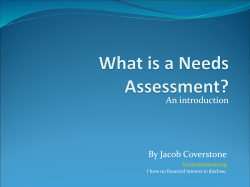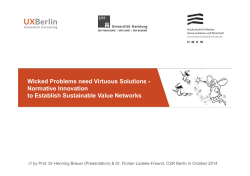
The Inter-American Human Rights System: The Law and Politics of
The Inter-American Human Rights System: The Law and Politics of Institutional Change 9-10 October 2015 Institute of the Americas University College London Inter-American Human Rights Network (IAHRN)1 CALL FOR PAPERS 1. Objectives & Overview This two-day workshop will examine the process of change in the Inter-American Human Rights System (IAHRS). Papers and presentations will examine the political factors that have shaped the institutional development of the Inter-American Human Rights System, the normative and legal transformation the IAHRS has experienced, and the effect of these changes on the impact, broadly defined, of the Inter-American human rights system. The presentations and discussions will later form the basis of a detailed conference report and a policy briefing to be disseminated among network contacts. A selection of workshop papers may be invited for inclusion in a scholarly publication. 2. Thematic Overview The IAHRN is inviting submissions related to any of the three key themes to be discussed during the workshop: 1) the politics of institutional change; 2) patterns of normative and legal change; and 3) the impact of these institutional and/or normative and legal changes. The Politics of Institutional Change: For this theme, we invite papers that examine the political forces at the local, national, regional and global level that have precipitated change at the IAHRS. Despite the increased number of ratifications of regional human rights instruments, there remains significant regional variation in this area. While most Latin American states demonstrate a high degree of formal commitment to the IAHRS, the US, Canada, and most of the English-speaking Caribbean have not ratified the American Convention and have not accepted the jurisdiction of the Inter-American Court. Moreover, 1 The Inter-American Human Rights Network (IAHRN) is an international research project, which seeks to examine the development and impact of the regional human rights system of the Americas. The network is funded by the Leverhulme Trust under its International Networks programme and its membership comprises leading and emerging scholars of the Inter-American system from across the globe. For further information, please visit the network website or contact Dr Par Engstrom (p.engstrom@ucl.ac.uk), or network facilitator, Peter Low (p.low@ucl.ac.uk). 1 significant political tensions surrounding the IAHRS in recent years suggest that processes of institutional development are not necessarily progressive, nor unidirectional. Efforts by states to constrain or rein in the system may need to be seen in the broader context of an uncertain future for the global human rights regime and shifting global power balances. From this perspective, one may argue that it is precisely the institutional development of the IAHRS that has prompted significant pushback by certain groups of states within the OAS. Papers submitted under this theme should consider the extent to which the system’s development is a story of progress and/or if the system has entered into a period of (irreversible?) decline after the rather remarkable institutional growth of the 1990s in particular. We also encourage authors to situate the politics of institutional change in the IAHRS within a larger context, whether that means domestically in member states or more globally. Patterns of Normative and Legal Change: We invite papers that examine how the IAHRS’ legal and normative framework has developed, and we particularly welcome papers that examine why normative changes have advanced inconsistently across issue areas and/or why some actors have been more receptive to IAHRS reforms than others. For example, the IAHRS has established states’ legal obligation to protect the rights of individuals and groups and has been committed to hold states accountable when they fail to live up to their human rights obligations. In the process, the IAHRS has developed regional standards incorporating a wide range of human rights norms that seek to regulate the relationship between the state and its citizens in diverse areas including transitional justice, freedom of expression, rights of indigenous groups and LGBTI rights. Yet, this normative expansion risks obfuscating the fact that these developments have been more significant in some issue-areas than others. There has, for instance, been a relative lack of normative progress on economic, social and cultural rights. Similarly, while some member states and IAHRS actors have been engaged with advancing the jurisprudence and normative framework of the IAHRS, others have resisted these reforms. Papers included under this theme should examine the processes by which these normative and legal changes address variations in the development and implementation of these reforms. Institutional Change and Human Rights Impact: Under this theme, we welcome papers that reflect upon the ways in which processes of institutional change are related to the impact of the IAHRS on human rights outcomes. For some, the normative and institutional evolution of the IAHRS has led to an increased interaction between the system and domestic political processes and national legal orders. Yet, the impact of the IAHRS and the extent to which the system has become embedded in domestic political and legal systems clearly vary across societies in the region. The IAHRS itself is also struggling to develop adequate responses to pervasive human rights problems. The significant growth in the IAHRS’ caseload has occurred without any corresponding rise in allocated resources by OAS member-states. And while on average states’ responses to the IAHRS may have improved over the course of the last two decades, some states continue to challenge the authority of the IAHRS. This raises a range of questions concerning the institutional effectiveness of the IAHRS and the prospects for institutional strengthening. To what extent have the institutional changes that the IAHRS has undergone enabled it to affect positive domestic human rights change? Are the institutional resources at the system’s disposal deployed where the need is the greatest and by, and/or on the behalf of, those groups and individuals most in need? 2 3. Submission Instructions The IAHRN is inviting submissions for papers related to any of the above topics. Please send your proposed title and abstract (500 words maximum) to p.engstrom@ucl.ac.uk and p.low@ucl.ac.uk by Monday 1st June 2015. Along with your proposal, please include your name and title, institutional affiliation, and biographical statement/abbreviated CV (200 words). Selected participants will be asked to submit draft papers in advance of the workshop for circulation among the workshop participants prior to the event to facilitate discussion during the workshop. Papers may be submitted in English, Spanish or Portuguese; the working languages of the network. International attendees are invited to indicate any funding needs in their original submission as some limited funds may be available to cover transport costs to the UK. 4. Logistical Information The workshop will be held at UCL’s Institute of the Americas, Gower Street, London, WC1E 6BT on 9th and 10th October 2015. The provisional programme outline is as follows: Friday 9 October 9:30 – 11:30. Session 1 11:30 – 12:00. Coffee break 12:00 – 14:00. Session 2 14:00 – 15:30. Lunch 15:30 – 17:30. Session 3 18:00 – 20:00. Roundtable discussion Workshop dinner Saturday 10 October 9:00 – 11:00. Research clusters breakout sessions 11:00 – 11:30. Coffee break 11:30 – 13:30. Reporting on breakout sessions 13:30 – 15:00. Lunch 15:00 – 17:00. Network review meeting (for current and prospective IAHRN members) 3
© Copyright 2025










